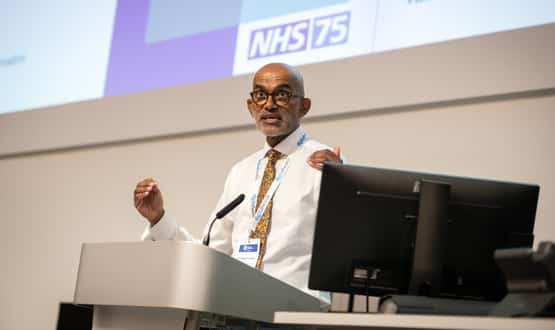Every NHS trust on track to have an EPR by March 2026 says Vin Diwakar
- 27 July 2023

Every trust across the NHS is currently on track to have an electronic patient record (EPR) in place by March 2026, Dr Vin Diwakar revealed at Digital Health Summer Schools 2023.
Speaking in the opening keynote session at the University of Birmingham, Dr Diwakar confirmed that both the government and NHS England’s previous EPR targets will not be achieved but that all trusts are currently on track to have a system in place by March 2026.
The then health secretary Sajid Javid set out in February 2022 a target of 90% of NHS trusts to have an EPR in place by December 2023, which is still on track to be achieved, however NHS England’s target for all trusts to have one in place by March 2025 has been pushed back by 12 months.
The medical director for transformation in the National Transformation Directorate and lead on the secondary care portfolio in the National Improvement Directorate was speaking in the opening keynote session of Summer Schools, which is celebrating its 10th anniversary.
NHS achievements
Dr Diwakar highlighted some of the NHS’ great achievements, having celebrated its 75th anniversary this year. Describing the organisation as “the greatest innovation this country has ever produced”, he told the audience that “the NHS is leading the world in co-production and patient-centred care”.
He shined a light on the NHS’ impact in increasing the average life expectancy from 65 to almost 80, urging those attending to “not forget the kind of organisation we’re working for”.
The opening keynote also spoke highly of the NHS App, explaining that more than 500k repeat prescriptions are delivered through the app every week and patients from 33 trusts can book appointments through it.
Lastly, in terms of achievements and future possibilities Dr Diwakar spoke about trusted research environments and the much talked about Federated Data Platform, believing that they “will help us use patient data in a different way” and “will give us access to data on how care is being delivered”.
Issues for the NHS
Dr Diwakar, who will replace Dr Tim Ferris later this year, stressed the importance of the digital maturity assessments but shared his concern that “only 21% of providers are what we [NHS England] consider digitally mature”.
He also said that waiting lists are rising fast, with GPs doing 35 million more appointments than they were a few years ago. As a result of the waiting list backlog, “the level of confidence in the NHS has gone down”, Diwakar claimed.
Digital Health Summer Schools is running today and tomorrow at the University of Birmingham, where CCIOs, CIOs, CNIOs and aspiring digital health leaders will enjoy two days of CPD-accredited content, rewarding education, networking, and best practice exchange, and have a unique opportunity to learn from the very best digital health leaders from across the UK.




